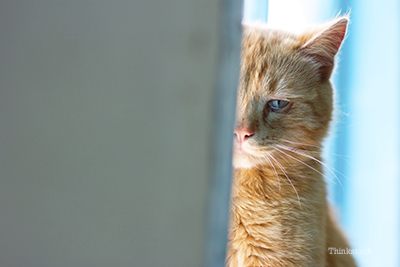
Have you ever considered the possibility that your kitty is stressed out? No matter how hard we try to create an enjoyable and peaceful home environment for our pet cats, at some point, most of them are exposed to stress in some form or another. Just as with people, how well our feline friends handle stress varies and depends on their inherent dispositions along with the nature of the stressor.
Three veterinarians at Autonomous University in Barcelona, Spain (yes, there really is such a place) have recognized the significant role stress plays in the lives of pet cats. Marta Amat, Tomas Camps and Xavier Manteca recently published an article that recaps what is known to date about feline stress. The article is extremely thorough and includes 150 references. It appears in the Journal of Feline Medicine and Surgery. This article titled, “Stress in owned cats: behavioural changes and welfare implications,” focuses on the causes and effects of stress along with strategies for stress prevention and reduction.
Why is it important to pay attention to this topic? Just as is true for people, cats who are stressed can suffer negative health consequences. Additionally, stressed kitties often manifest undesirable behaviors that can result in re-homing or, worse yet, euthanasia.
Causes of cat stress
There are many potential triggers for feline stress. The authors of the article mentioned above believe that the following stressors are the most significant:
- Environmental changes such as introduction of a new household member or change in the physical environment
- Change in the daily routine
- A barren environment that creates a lack of stimulation and few opportunities to express normal feline behaviors such as hunting, scratching and territorial communication
- A poor human-cat relationship arising from inappropriate socialization, too little handling, or punishment
- Conflicts between cats that can arise from the introduction of a new cat into the household, reintroduction of a familiar cat that has been away from home (at a veterinary hospital or boarding facility) and competition for resources such as food bowls and resting places.
Health consequences of cat stress
Amat et al, emphasize that a stressed kitty is more prone to health issues and that stress is commonly associated with suppression of normal immune system function. The following examples of stress-induced health issues were discussed in the article:
- Herpes virus infections are commonly reactivated by stress. Affected cats develop upper respiratory symptoms including sneezing and discharge from the eyes and nose.
- Bouts of feline interstitial cystitis (FIC), an inflammatory condition of the bladder, often occur on the heels of a stressor such as the introduction of a pet sitter or new cat into the household.
- The symptoms of skin disease can intensify in response to stress. This is particularly true for cats with skin allergies.
- Stress has been associated with a variety of gastrointestinal issues, resulting in symptoms such as loss of appetite, vomiting, and diarrhea.
Behavioral consequences of cat stress
Exposure to stress can result in a wide range of behavioral changes that can negatively impact the cat’s quality of life. Unfortunately, as Amat et al point out, these changes are a very common cause of giving up or euthanizing cats. The more common behavioral abnormalities resulting from stress include:
- Not eating as much
- Change in grooming behaviors
- Playing less
- Exploring less
- Less facial marking (kitty not rubbing her face against objects in the environment, including her favorite humans)
- Less positive interactions with other cats and humans
- More vocalization
- Hiding
- Urine marking (includes spraying and urinating indoors, outside of the litter box)
- Aggressive behavior
- Compulsive behavior such as over-grooming or eating non-food items (plastic, rubber bands, fabric, etc.)
Stress reduction strategies for cats
In their review, Amat et al cover a wide range of stress reduction strategies. Ideally, if a stressful stimulus can be identified, it should be removed from the cat’s environment. When this is not possible, as often is the case, gradual exposure to the stressor within a pleasant context may diminish the stress response.
Controlling inter-cat conflict to reduce cat stress
The article reviews a multi-phase method to reduce stress arising from conflict between cats living in the same household. The steps include:
- Complete separation: The cats are kept in completely separate parts of the house with separate food, water bowls, litter boxes and toys.
- Olfactory habituation: Locations are reversed so that each cat is exposed to the odor of the other.
- Visual habituation: The cats remain physically separated, but are allowed to see each other through a screen or mesh door.
- Direct contact habituation: The cats are allowed physical access to one another.
Click here to learn more about introducing new cats to the household.
Environmental enrichment to reduce cat stress
Amat et al emphasize the importance of providing ample space and resources (food, water, resting places, toys, litter boxes) for each individual cat. Additional stress reduction strategies include the following:
- Installing cat trees, shelves and platforms to allow the cat to explore space vertically and horizontally
- Providing fun kitty hiding places
- Frequently changing out toys to stimulate curiosity and interest
- Providing moving toys that mimic small prey
- Hiding treats within the environment
Chemical stress relief for cats
The authors briefly touch on the use of some chemical stress relievers like medications, pheromones and aromatherapy. It’s important to talk with your veterinarian if you are considering these options.
Whatever you do to help your cat feel good, I encourage you to have a conversation with your veterinarian if you suspect that your kitty suffers from stress. It’s important to rule out an underlying medical condition because disease-induced and stress-induced symptoms and behaviors can look the exact same!
If you have any questions or concerns, you should always visit or call your veterinarian -- they are your best resource to ensure the health and well-being of your pets.
